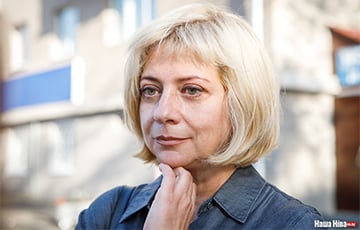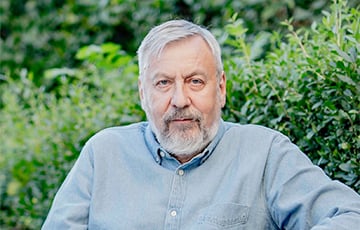Azaronak With Fake Dollar Bill
30- 29.11.2024, 18:41
- 39,760

PHOTO: NASHA NIVA
There will be no money as long as there are political prisoners.
Yesterday, Azaronak burned a dollar note. True, only a one-dollar note. I remembered Dovlatov's story about the inscription near a stand in a provincial museum of local lore: "Personal belongings of the partisan Bosniuk: a bullet from his skull and a nail with which he wounded the fascist." And Dovlatov's comment: "The partisan Bosniuk had a good life!"
Just two weeks ago, my friends and I made a bet on whether the dollar would reach the level of 3.5 rubles by the New Year. It turned out that we didn't have to wait for any New Year. A dollar for 3.5 could be enjoyed as early as Tuesday, and by Thursday it was 3.59 at all. Hrysha Azaronak immediately ran to the exchanger, bought a dollar and publicly burned it to demonstrate the abundance of dollars and the absence of panic. Why did you burn only one, Hrysha? Did partisan Bosniuk having a good life still has not enough money for a hundred? Or did you prefer to hide a hundred in a cup just in case, to other equally cute green pieces of paper?
Immediately after the story with Bosniuk, I remembered the collapse of the ruble in 2011. I was then under house arrest with two KGB officers in the apartment. According to the instructions, they were obliged to be together for 24 hours, but in the spring for some reason they ran in and began to leave in turn. It turned out that while one is on duty, the second is running around the exchangers. Then they change. In the evenings, they discussed what to do in a situation when the ruble flies down at such a speed that it cannot be caught up. They made plans: it was necessary, they said, to immediately take ruble loans. This amount will be halved by autumn, judging by the dollar exchange rate, and you will have to pay a penny on the loan – these pieces of paper, called the national currency, will cost nothing, and the amount in the loan agreement will remain the same.
At that time, my husband Andrei Sannikov was in the KGB pre-trial detention center, and one day he was summoned by the head of the prison and began to ask carefully: what is your forecast about the exchange rate of the Belarusian ruble by the end of the year? Andrey answered: and add one hundred rubles to the dollar exchange rate for each day of our stay, so there will be a course for you. By the way, that's how it turned out. If in January 2011 the dollar cost three thousand non-denominated rubles, then in May it cost about five thousand in exchangers, and more than six thousand on the black market. However, there was still no dollar in the exchangers – at any rate. Lines from the night, numbers on hands, roll calls, duty at the door of the bank on a stool brought from home – all these Belarusians experienced in the spring, summer, autumn of that year.
If someone suddenly, fearing to sell currency from his hands, went to the bank to legally exchange it for rubles, a ring began to narrow around this person – people sitting on benches or standing at the walls approached so that the client would not change his mind and leave. Whoever is closer will rush to the window of the cash desk after handing over the currency. However, I did not have to look for money on the black market either: it was enough to get a bill anywhere – at a gas station, in a hairdresser's shop, in a cafe – and ask where the nearest exchange office was. Employees immediately said: "Why do you need an exchange office? We will change your currency at the best rate!" In the largest medical center of Minsk at that time, a vacation schedule was drawn up, and the priority right to buy dollars from a patient who wanted to pay in foreign currency was given to the one who went on vacation first. And the queues for vacuum cleaners and refrigerators, in order to at least attach these depreciating pieces of paper somewhere, remember, I think, everyone who lived in Belarus at that time.
In the autumn of 2011, the dollar was already worth 8,680 rubles, and even the then head of the National Bank, Nadzeya Yarmakova, admitted that the devaluation during the year amounted to 189%. The ruble shook like a fiasco for several more years, and at the end of 2014 it fell by 30% in one day. And only in 2015, when the last then political prisoner Mikalai Statkevich left the prison walls, the situation on the foreign exchange market stabilized – it even seemed that it was already final. But it turned out that before a new wave of repression.
So the dollar rate depends not on sanctions, not on investments, not on the volume of exports and imports, but on political prisoners. There are political prisoners in Belarus – there is no financial stability, and the ruble flies to the tartars. There are no political prisoners – there is hope that the crises will remain in the past. And this is such a direct, unmasked connection that only "alternatively blessed" – like Hrysha Azaronak can ignore it.
By the way, to be honest, I do not believe that Azarenok burned a real dollar. I suspect that it is still fake: greed would not allow him to burn a real, live, expensive green bill worth as much as three and a half rubles. And this bill, like Picasso's canvas, is becoming more expensive every day. So for sure it was BT (Belarusian state-owned TV channel) designers from the who stood over the computer and printer all night until it turned out to be like the original. Burn on, Hrysha.
Iryna Khalip, especially for Charter97.org











